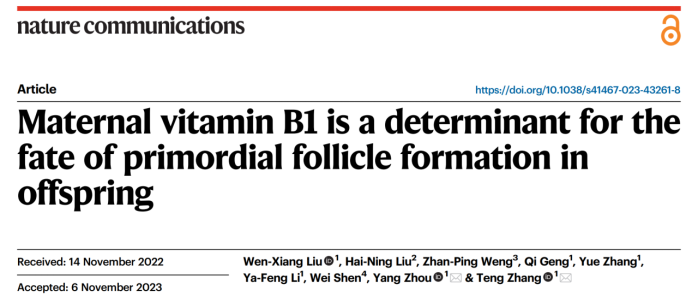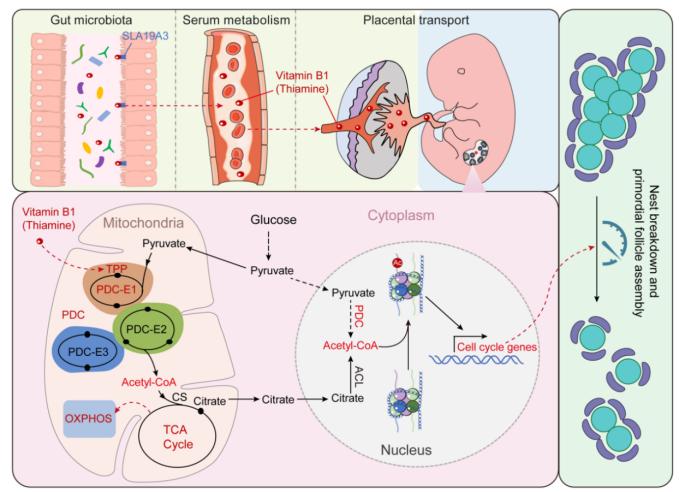The maternal nutrition intake and metabolism has a significant and lasting effect on the health of fetus and neonate. And maternal microbial metabolites and xenobiotics play pivotal roles in the modulation of maternal-fetal homeostasis and offspring development. However, there still exist many outstanding questions in the “black box” of maternal-fetal crosstalk. We are far from knowing its long-term effect on the offspring health. Follicles are the basic units that maintain the functions of mammalian ovaries and the reserve of primordial follicle pool determines the sustained fertility of females’ reproductive life. The size of primordial follicle pool has been determined in the fetal period. After the birth, the primordial follicles are not regenerated and will be continuously activated and exhausted with age.
Recently, the research team of Prof. Zhang Teng and Prof. Zhou Yang with the State Key Laboratory of Reproductive Regulation and Breeding of Grassland Livestock of IMU has published in the Nature-index top journal of Nature Communications, the research article titled “Maternal vitamin B1 is a determinant for the fate of primordial follicle formation in offspring”. The research found that maternal high fat intake during pregnancy induced vitamin B1 insufficiency in maternal gut microbiota and led to mitochondrial dysfunction of germ cells and impairment of granulosa cells of female offspring, which had an influence on the formation of primordial follicle pool. It was also found that the vitamin B1 supplementation could boost the metabolism of acetyl-CoA in the ovaries of female offspring, which promotes the modification of histone acetylation and chromatin accessibility, improves the mitochondrial function, enhances the granulosa cell proliferation and restores the reserve of primordial follicles. This research work reveals the lasting effect of non-gamete transmission from mother-to-offspring during pregnancy on the reproductive health of offspring.

The research team found that the body weight, body length, and ovary size of newborns from high-fat-diet mice were less than those of offspring from normal-diet mice. What is important is that the primordial follicles were dramatically reduced in the offspring from high-fat-diet mice compared with the normal-diet mice and the quality and developmental potentiality of oocyte of sexual maturity also drastically decreased. Then, it was found with 16S rDNA sequencing of maternal serum metabolome and gut microbiota that maternal high-fat diet during pregnancy disrupted the balance of gut microbiota and led to insufficiency of vitamin B1 in serum. And fecal microbiota transplantation experiments indicated that the disruption of the balance of gut microbiota caused by high-fat diet during pregnancy reduced the protein expression of vitamin B1 transporter SLC19A3, leading to the insufficiency of vitamin B1 in maternal serum.
The research team further conducted an analysis with single cell RNA sequencing technology and found that among the high-fat-diet mice the mitochondrial function of their offspring was abnormal and the gene expression related to oxidative phosphorylation decreased dramatically. Thiamin pyrophosphate (TPP), an active form of vitamin B1, is a coenzyme of pyruvate dehydrogenase complex E1 (PDC-E1 or PDH), and is responsible for the conversion of pyruvate to acetyl-CoA. Therefore, it was assumed that vitamin B1 alone could not influence the synthesis of acetyl-CoA and reduce mitochondrial function. Further research suggested that maternal vitamin B1 insufficiency led to the drastic reduction of PDH activity and levels of acetyl-CoA and histone acetylation in offspring ovaries while the supplementation of vitamin B1could restore mitochondrial function.
The proliferation of granulosa cells which migrate to surround oocytes is indispensable in the formation of primordial follicles. It is found with assay for transposase-accessible chromatin sequencing and single cell RNA-sequencing that when vitamin B1 is insufficient, the chromatin accessibility in the promoter regions of the genes which are related to cell cycles of granulosa cells, drastically goes down and EdU (Proliferation labeling) positive cells among granulosa cells dramatically decrease. And the supplementation of vitamin B1 can restore the proliferation of granulosa cells.
The research work provides a new treatment perspective for the protection of the offspring health, i.e. to prevent the negative influence of maternal high-fat diet on the reproductive health of female offspring.

The regulation mechanism of maternal metabolite, vitamin B1, for the formation of primordial follicle of offspring
URL: https://doi.org/10.1038/s41467-023-43261-8
Prof. Zhang Teng and Prof. Zhou Yang are co-corresponding authors of the article. Liu Wenyang, a PhD student admitted to IMU in 2020, is the first author of the article. The research is supported by the National Natural Science Foundation of China and Inner Mongolia Autonomous Region Program for Young Talents of Science and Technology.

